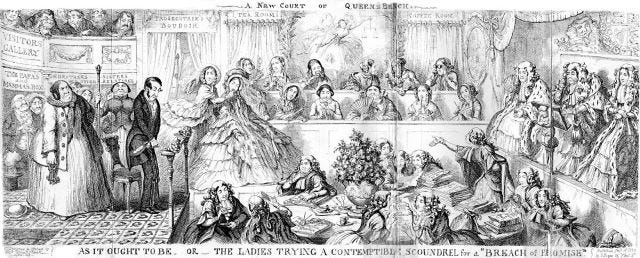The Bluestocking, vol XIV: Ding dongs, bing bongs and the luxury of silence
Good evening!
I hope your week has been short and stress-free. Mine started with the Andrew Marr show on Sunday, although I now learn that I didn't get to boggle at David Cameron's seamfree face up close because all the other guests were kept in a separate room so the PM didn't have to talk to Len McCluskey. Politics can feel a lot like school sometimes.
I spent most of the rest of the week resisting the urge to get involved in the row over the film Suffragette "whitewashing" the movement. There did seem to be quite a large constituency of people on Twitter who assumed that because Meryl Streep was in the film, it must be about America. (Irony: producers put an American actress in the film because otherwise Americans won't go to see it; Americans take her presence as evidence the film is about them.) While it's true that there were non-white Suffragettes in England (Anita Anand wrote a book on one, Princess Sophia Duleep Singh), they were much more rare, given the country's very different demographic. (In the end, my colleague Anna talked to historians and wrote a very interesting piece; some of the Suffragettes went fascist after the First World War, while others were radical anti-racists.)
Until next week,
Helen
Stop Googling; let's talk
Young people spoke to me enthusiastically about the good things that flow from a life lived by the rule of three, which you can follow not only during meals but all the time. First of all, there is the magic of the always available elsewhere. You can put your attention wherever you want it to be. You can always be heard. You never have to be bored. When you sense that a lull in the conversation is coming, you can shift your attention from the people in the room to the world you can find on your phone. But the students also described a sense of loss.
Definitely don't recognise any of this. Deffffffffinitely. *checks phone*
What should using a computer sound like?
When Microsoft approached ambient music pioneer Brian Eno during the development of Windows 95, for instance, it wanted an entire company manifesto packed into the space of a boot screen . "The thing from the agency said, ‘We want a piece of music that is inspiring, universal, blah-blah, da-da-da, optimistic, futuristic, sentimental, emotional,’ this whole list of adjectives," Eno said in a 1996 interview. "And then at the bottom it said, ‘And it must be 3 1/4 seconds long.’" He apparently liked the idea so much he created 84 of them.
This piece on Skype's new sounds is quirkily fascinating, particularly since you won't realise until you read it that certain sounds you used to hear every day have disappeared from your life. Shed a nostalgic tear for the Nokia ringtone and the world of possibility it represents.
The woman behind the Myers-Briggs personality industry
No matter how forcefully one may protest their type, the indicator's only claim is that it holds a mirror up to your psyche. Behind all the pseudo-scientific talk of "instruments" and "indicators" is a simple, but subtle, truth: the test reflects whatever version of your self you want it to reflect. If what you want is to see yourself as odd or original or factual and direct, it only requires a little bit of imagination to nudge the test in the right direction, to rig the outcome ahead of time.
Basically, the Myers-Briggs test is a horoscope wrapped up in corporate-speak, right?
Picture: even slugs can be beautiful. (that's probably a life lesson, right there)

Quick links: Anonymous's Barrett Brown reviews Jonathan Franzen's Purity from his prison cell. (Sample line: "Put it this way. I was interested enough in WikiLeaks, state transparency, and emergent opposition networks to do five years in prison over such things, but I wasn’t interested enough that I would have voluntarily plowed through 500 pages of badly plotted failed-marriage razzmatazz by an author who’s long past his expiration date simply in order to learn what the Great King of the Honkies thinks about all this.") On 2015, the Year of Identity: "I live with two identities: mine and others’ perceptions of it." What Rick Moranis has been up to for the last three decades. Why noise is a class issue and the rich are increasingly paying for silence. Should we be so hard on lonely men who call themselves "incels"?
Bonus picture: Cruikshank's Queen's Bench (full size here), a satire on women being allowed in the judiciary. I can't remember who it was who observed that anti-feminist propaganda now often just looks like a lot of women having a really great time. See also this.

That's all, folks! If you enjoyed this, forward it on . . . and encourage people to sign up at tinyletter.com/HelenLewis

